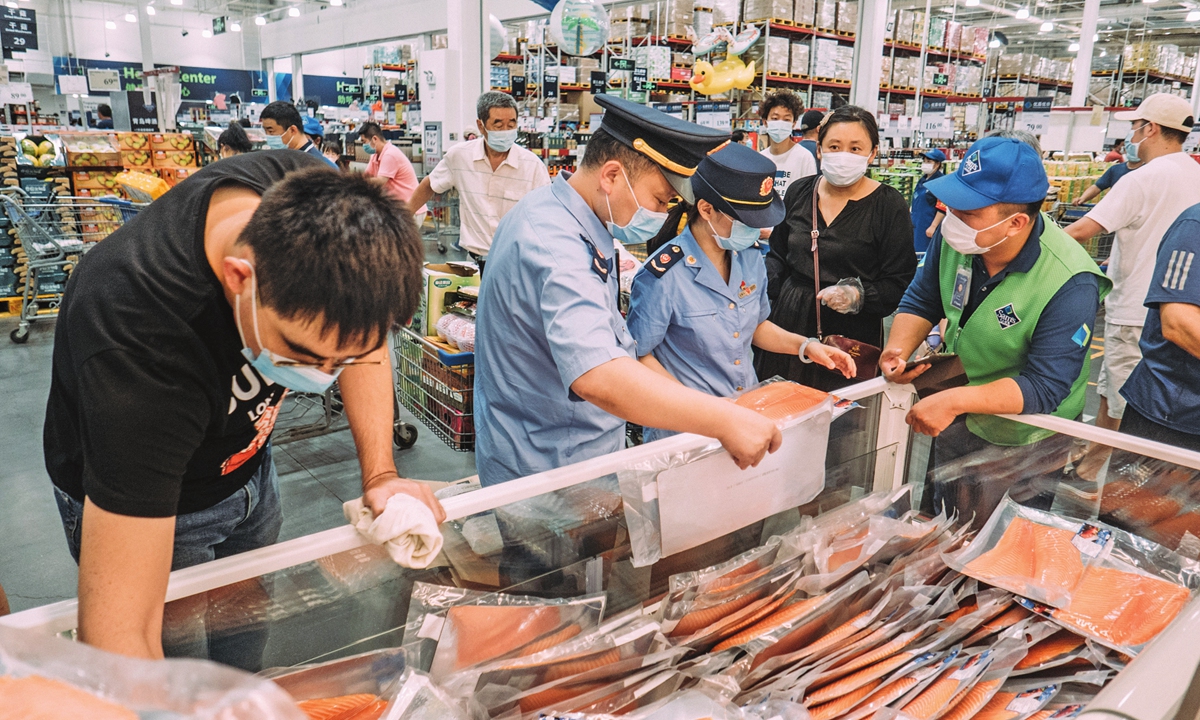China's coronavirus-triggered salmon boycott could lead to industrial losses of $100 million: Norwegian salmon trader
Source:Global Times Published: 2020/6/16 15:13:40

Food and Drug Administration employees check salmon in a Sam's Club store in Beijing on Saturday. Photo: Li Hao/GT
Salmon-related industries in China, from manufacturers and dealers to Japanese restaurants, are facing an unprecedented challenge after the discovery of COVID-19 on an imported salmon seller's chopping board at a Beijing wholesale market, industrial insiders said. They estimate the total industrial loss is likely to surpass $100 million.
The discovery, revealed by the chairman of the market in an interview on Friday, has aroused a nationwide boycott of the fish, with restaurants and supermarkets rushing to remove salmon from their shelves even without an official order to do so.
Such changes are quickly weighing on China's salmon-related industries. Eason Li, China general manager at Norwegian seafood processor Hofseth International AS, which entered China about three years ago, said the incident is like a splash of cold water. The company had just seen sales recover after the coronavirus epidemic wanes in China and had placed great hope in the market.
Over the weekend, all of Hofseth's clients in China who had not made final confirmations asked to cancel their orders, while those who had already made orders requested delayed delivery or an adjustment in price, Li told the Global Times.
But the pressure is even greater for salmon wholesalers or dealers who can't sell the fish to their end customers like supermarkets or return the products to manufacturers under the current situation.
"Salmon is becoming like tons of hot potatoes for them, depreciating on a daily basis," he said.
Stricter customs clearance requirements are also causing a headache for salmon sellers. For imported salmon already being delivered to China, they run the risk of it piling up at Chinese ports. That would not only mean extra cold storage fees for businesses, but risks a drag on the market after the fish's warranty period has passed.
According to Li, Beijing's customs have stopped imports of all seafood products and Shanghai has raised quarantine requirements for imported salmon, requiring each batch of imported salmon to be tested for COVID-19. The prolonged quarantine process will extend the shipping process by about one or two days.
In total, he predicted the salmon boycott would cause an industrial loss of 500 million yuan ($70.7 million) if iced salmon trading is stopped for one month in China, and that the total loss for the industry could surpass 700 million yuan.
According to data provided by salmon information portal Salmon Business, global salmon farmers export about 100,000 tons of salmon to China every year, with Norway, Australia, Canada and Chile being the main sources of China's imports. In the first four months of the year, salmon exported from Norway accounted for about 45 percent of China's total iced salmon imports.
Epidemiologists in China said that analyses of the virus strains in the US showed that most came from Europe or Russia, and it's possible the virus might have re-entered China via imported, contaminated seafood or meat after packaging and cold-chain transportation from overseas.
But Yang Zhanqiu, deputy director of the pathogen biology department at Wuhan University, told the Global Times that COVID-19 does not infect fish or other aquatic organisms based on past research, therefore it is almost impossible that salmon can be an intermediate host of the virus.
Posted in: ECONOMY